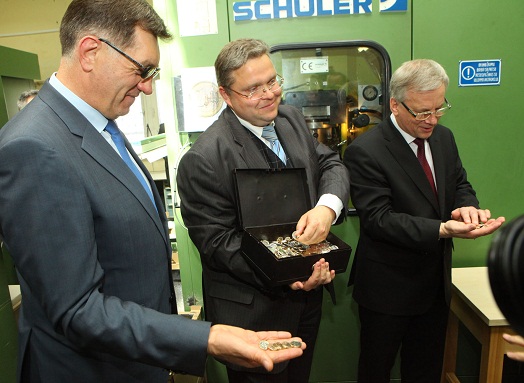
Traders continue to set the prices for metals by shouting it out loud to one another at London Metal Exchange for 137 years now (Photo by Viktorija Rinkeviciute).
The only major international market in Europe where traders still agree on a price by eye-to-eye shouting and bidding – the London Metal Exchange (LME) – has survived a two-decade competition of electronic trading. Its new Chinese owners agreed to keep a century old tradition of setting benchmark prices for metals by such a method, but it is not clear for how long. Experts, however, say keeping the open-outcry trading is the least of LME’s issues in comparison to getting ahead of Shanghai Metal Exchange in the race for China.
The clock in a circular room at 56 Leadenhall Street in London, in the heart of the old financial district of the city, shows 12:30 p.m. Contrary to the general relaxed lunch atmosphere on streets outside of the London Metal Exchange, tension is building up in the red pit.
This is where ten ring-trading members from such companies like JPMorgan Chase & Co or Societe Generale SA will set the daily benchmark prices for 11 widely used metals, like copper, aluminum and zinc. The price negotiated on the trading floor will serve as basis for most physical metal contracts of today.
An open-outcry system, involving shouting and special hand gesturing to convey information for price negotiation, say LME experts, faces the same challenge as every futures market: how to come to a representative settlement price.
More transparent
LME’s open-outcry method “concentrates liquidity at the second morning ring and that prevents any particular trader from influencing the settlement price too much,” explained professor Christopher Gilbert from University of Trento in Italy, who has been following the LME for decades.
However, introduced more then two decades ago, electronic trading is perceived by some as a faster, cheaper and more effective method of trading for users.
Yet the old-fashioned open-outcry system is seen as more robust, informative and transparent than electronic trading by its participants. “It allows them to feel how trading is taking place by observing the identities and the behavior of other traders on the flour, since traders are seeing each other and maintain physical contact with their seats,” explained Lina Datkunaite, Economic Researcher, Statistician and Analyst, researching the LME’s aluminum market.
“This may be particularly important for large traders, where transparency of the process and trustworthiness are crucial for large orders,” she said in an email interview.
Open-outcry is going
A loud gong announces the second ring trade for copper. The ring – a set of red leather sofas, arranged in a six-meter diameter circle – fills up with men in suits immediately.
“25!” – someone cries out in a pit and the echo of similar shouts ripples around a closed-off room with 22 booths.
As if they were jugglers, 5 to 10 people in every booth manage to hold at least one telephone receiver to each of their ears, a pen and a notepad. Together with 2-3 people just outside the ring, frantically making hand signals to each other as if auditioning for a leading role in a shadow theatre, they form a team every pit-trading member has behind his back. The team gets orders from company’s headquarters by phone and passes it to the trader in the pit.
Yet, only half of the booths are filled in. According to the Financial Times, from a high of about 30 ring-dealing members in 1980s, only one third of that number is still taking advantage of LME’s open-outcry trading system.
Since the LME opened up to electronic trading in 2001, the relevance of open-outcry trading diminished and, according to various sources, now accounts for only 5 percent of all LME operations.
Two years ago Hong Kong Exchanges & Clearing Ltd. bought the LME for $2.2 billion. It has recently promised to keep the nearly extinct tradition of eye-to-eye bidding running for as long as the market needs it.
“The LME came back into existence after the war and it’s been working for 67 years without problems,” Trento University’s Gilbert said of LME’s open-outcry importance in a Skype interview. “If it’s not broke, don’t fix it.”
“The switch is inevitable,” argued Datkunaite. “It will not necessarily come up soon or will be implemented quickly, because electronic platform will have to be adapted accordingly with the LME participants’ needs of preserving and retaining transparency besides liquidity costs or transaction’s speed concerns.”
Shanghai battle
In Gilbert’s opinion the LME should now focus on “the biggest competition it ever faced” – winning against Shanghai Metal Exchange in the race for China’s metals market.
“Shanghai is the market within mainland China and the LME is the market outside of mainland China. Because it is not easy to get copper or any other metal in and out of China due to taxes, government control and foreign exchange, China is not yet completely open,” said Gilbert.
Therefore, the world can’t use Shanghai to get the benchmark prices for metals and, equally, Chinese companies don’t use the LME.
“But when China opens up completely, Shanghai and LME will compete for setting that price. Who gets the Chinese market will have the world,” Gilbert said. “LME needs to make sure it is the winner of the battle with Shanghai.“






 More than 5 cities in 10 days, about 20 hours of raw footage, more than half a year of production work. Here’s the second “baby” from my trip to Japan in June. A documentary about Japan’s innovative ways to compete with China and rise after the biggest earthquake and tsunami in the country’s history.
More than 5 cities in 10 days, about 20 hours of raw footage, more than half a year of production work. Here’s the second “baby” from my trip to Japan in June. A documentary about Japan’s innovative ways to compete with China and rise after the biggest earthquake and tsunami in the country’s history.